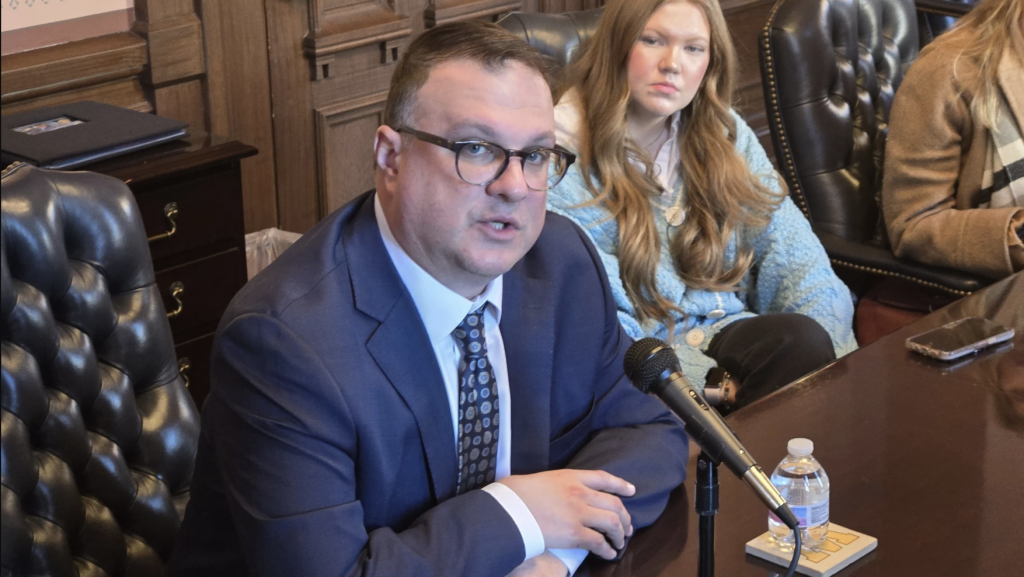New Michigan House speaker talks first bills, taking charge, working with Dems in first press conference
Colin Jackson January 10, 2025Republican Rep. Matt Hall says he created a special committee this week to deal with changing minimum wage laws, alongside other policy committees.

Michigan House Speaker Matt Hall (R-Richland Twp) speaks at a news conference on Thursday, January 9, 2025.
The new Republican speaker of the Michigan House says he’s not sure if or when he’ll forward the final bills passed during the previous legislative session to the governor’s desk.
The issue came up when Matt Hall (R-Richland Twp) took over as House Speaker during the start of the new legislative session Wednesday. At that point, the process of sending the governor bills passed during the last session hadn’t yet finished.
Hall said he told the House clerk’s office to pause once he took charge so lawyers could look through them first.
“Can a new Legislature even present what an old Legislature did? I don’t have answers to all this stuff. I just know that I have a duty to — I don’t like to rush. I stopped. I said we need a legal review, we need to look at this very carefully,” Hall told reporters during a press conference Thursday.
Earlier in the day, Gongwer News Service reported those nine bills included ones dealing with history museum millages, expanding access to the state police pension system, and health insurance premiums for public employees.
The state constitution says “every bill passed by the legislature shall be presented to the governor.” But it doesn’t outline a timeline for that process.
Hall argued Democrats have sat on bills for weeks in the past before sending them to the governor.
“So, you can hold these things a long time and then you can present. I’m just saying that I wanted to do a legal review and we’re going to do a very thorough legal review to look at these bills. I mean, there could be a lot of technical problems with the bills,” he said.
The bills in question were passed in mid-December.
As far as policies for this year go, Hall predicted minimum wage and sick leave bills will pass within “the next few weeks.”
The state is set to see the minimum wage for both tipped and non-tipped workers jump in February.
Meanwhile, most Michigan workers could start earning at least 72 hours of guaranteed sick leave a year, depending on how much they work.
Business groups have shared concerns about both plans.
Hall said he created a special committee this week to deal with the topic, alongside other policy committees.
“These committees are going to be talking to people across Michigan and understanding the impact of these policies, taking these introduced bills and making sure they work. That’s one of the reasons committees matter. When you have committee hearings, you learn things and you say, ‘We’ve got to make some adjustments,’ and that’s what’s going to happen,” Hall said.
House Republicans and Senate Democrats have both introduced bills to allay some of the business community’s fears.
As of Thursday night, the Select Committee on Protecting Michigan Employees and Small Businesses is the only House committee with assigned membership.
Traditionally, the House Appropriations Chair has at least been named by this point, with budget season beginning in earnest this week.
Hall said the lack of assignments was a mix of having to find placements for everyone and “taking on the responsibility of looking at a lot of the Democrats’ assignments too.”
When asked to explain further why he had concerns about Democratic placements, Hall referenced a belief that committees shouldn’t be used to “instill party discipline.”
Jess Travers, a spokesperson for House Minority Leader Ranjeev Puri (D-Canton), rejected the idea that Democrats were making committee assignments inappropriately.
“Leader Puri has not created any obstacle to committee assignments. He is unaware of what the Speaker might be referring to – the insinuation is simply nonsensical,” Travers said in a text when asked for comment.
In other policy areas, Hall warned not to expect “fast action” on Senate bills to expand the Freedom of Information Act despite him voting for similar bills in previous years.
Instead, Hall pointed to transparency in spending and stopping lawmakers from immediately becoming lobbyists as bigger priorities this time around.
Those could be topics to work out through the what Hall predicted would be “growing pains” of building relationships with leadership in the Democratic controlled Senate and governor’s office.
Hall, who served as minority leader in the House for the past two years, said he hopes to loosen some of what he perceives as the governor’s influence in the chamber.
New House rules remove department heads and liaisons from the governor’s office from the list of people who have access to the House floor.
“People have asked me, ‘Do you think this is going to be combative two years or do you think it will be a productive two years?’ I think it’ll be both. It’ll be combative and productive because we’re going to get a lot done. That’s what happens when you have strong leadership,” Hall said.
